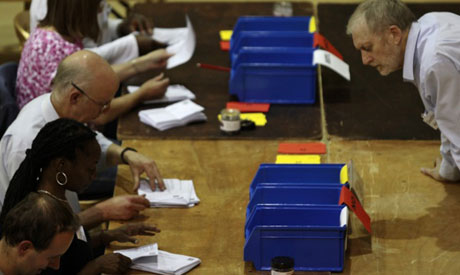
Workers count ballots for the referendum on the Alternative Vote, in a sports centre in Vauxhall, London, May 6, 2011. In the first nationwide referendum for more than 30 years, Britons were asked whether they wanted to replace the first-past -the-post method of electing Westminster politicians with an "alternative vote" system in which they could rank candidates in order of preference.
REUTERS
Deputy Prime Minister Nick Clegg's Lib Dems suffered a double blow when voters overwhelmingly rejected a change to the electoral system in a referendum this week while the party was crushed in local elections.
Business Secretary Vince Cable, a Liberal Democrat cabinet member , lambasted the "ruthless, calculating and thoroughly tribal" Conservatives and said their alliance in future would be more "businesslike".
"But that doesn't mean to say we can't work with them. I think they have always been that way, but you have to be businesslike and professional and you have to work with people who aren't your natural bedfellows," he told the BBC.
Cable warned however that the centrist Lib Dems would not accept any policies that went beyond the coalition agreement they made with the centre-right Conservatives after general elections in May 2010.
Cameron was accused of betrayal after the campaign against changing to the Alternative Vote (AV) system favoured by the Lib Dems savaged Clegg for "broken promises" -- even though Clegg broke election pledges to support Conservative-led cuts.
The coalition is pushing through harsh austerity measures to tackle Britain's record deficit.
Clegg described the results as a "bitter blow" for political reform, as commentators predicted that the referendum had ended all hope for a generation of changing the way Britain elects its lawmakers.
"But the answer is clear and the wider job of the government and the Liberal Democrats in government will continue -- to repair the economy, to restore a sense of prosperity and jobs and optimism to the country," he said.
Final results from Thursday's referendum showed a total of 67.9 percent of voters -- 13,013,123 -- had rejected a move to AV, while just 32.1 percent supported the idea. Turnout was 42 percent.
The Lib Dems also had their worst results in local council elections for a quarter of a century.
The Conservatives, however, emerged largely unscathed in the local elections while Cameron had also backed the campaign against AV, which would have allowed voters to rank their preferences, as opposed to the current first past the post system.
Cameron said the campaign had been "difficult" for the government.
"I believe that what the British people want us to do now is to provide a good, strong, decisive government in the long-term national interest of this country, Conservatives and Liberal Democrats working together," he said.
The elections were also good news for the Scottish National Party, which won the first overall majority in the devolved Edinburgh parliament since it was formed in 1999, paving the way for a referendum on independence.
First Minister Alex Salmond pledged to hold a referendum on breaking the 300-year-old bond with the United Kingdom within the next four years.
Elections were also held for the assemblies of Wales, where Labour fell just short of a majority, and Northern Ireland, where the Democratic Unionist Party and republicans Sinn Fein were set to continue their power-sharing.
Commentators agreed the elections had been disastrous for the fresh-faced Clegg but differed on what the results meant for the future of the coalition.
The main question appears to be whether a strengthened Cameron will try to prop up Clegg to keep the coalition afloat, for example by offering concessions on issues such as health reform, or to push for elections and a full majority.
"It is hard not to see Cameron as the winner of Thursday's election," Tony Travers, a political expert at the London School of Economics, wrote in the Guardian.
John Curtice, a professor of politics at Strathclyde University, wrote in The Independent that Clegg had already signalled that the Lib Dems would "adopt a more robust approach in their dealings with the Conservatives in the future".
Short link: